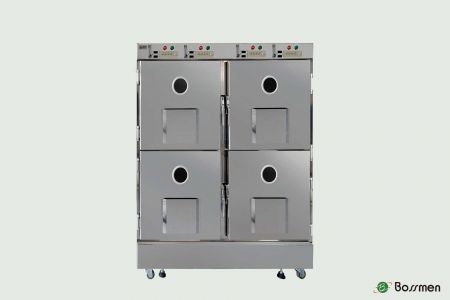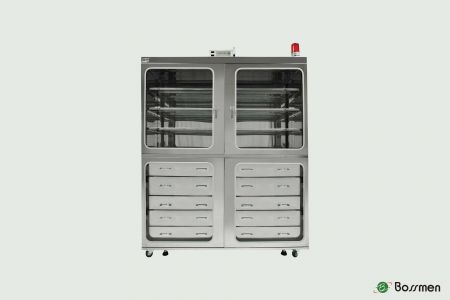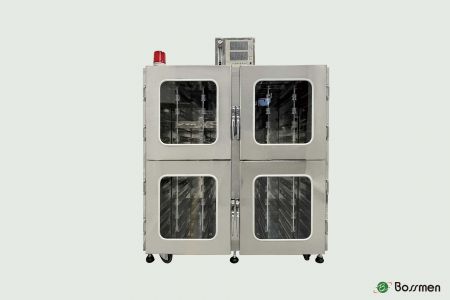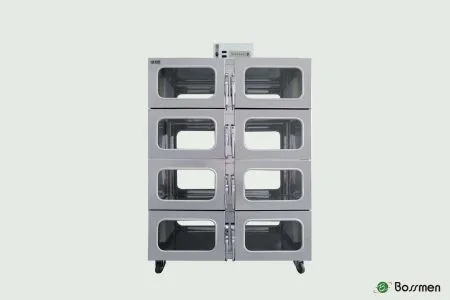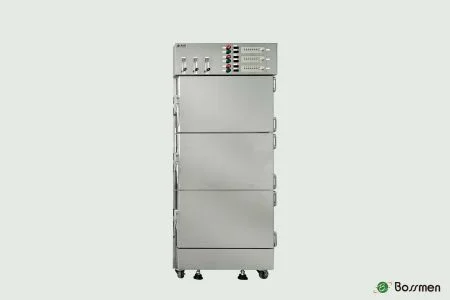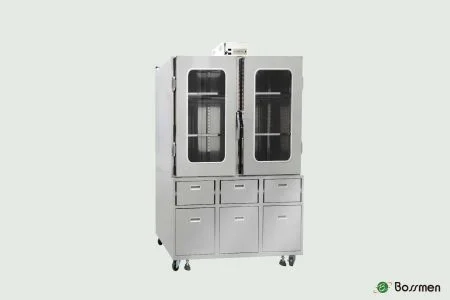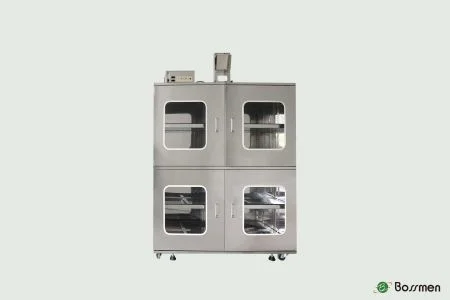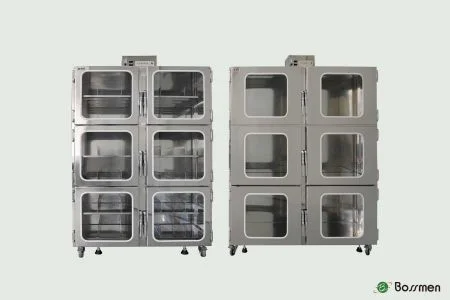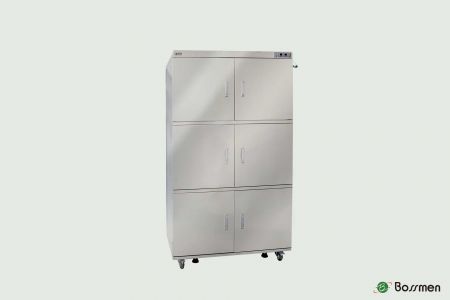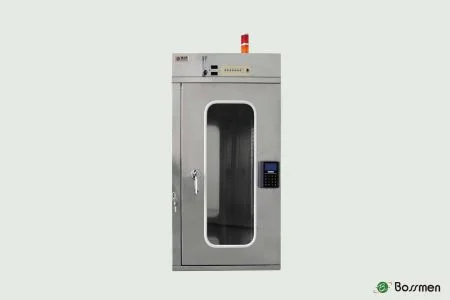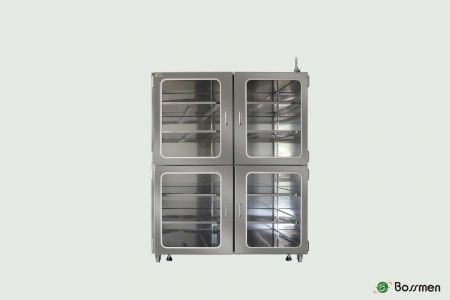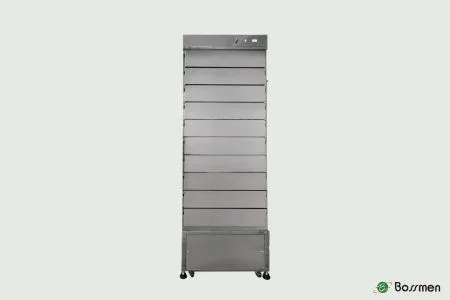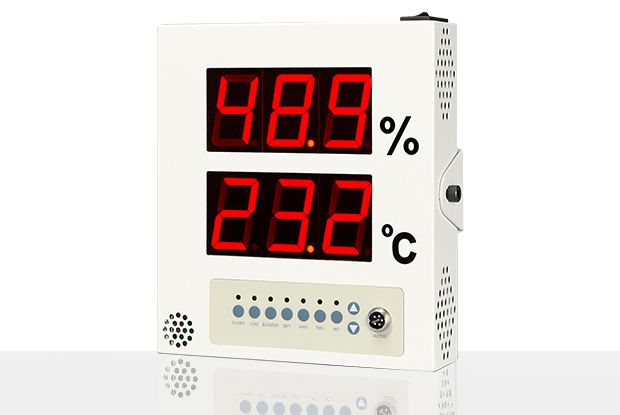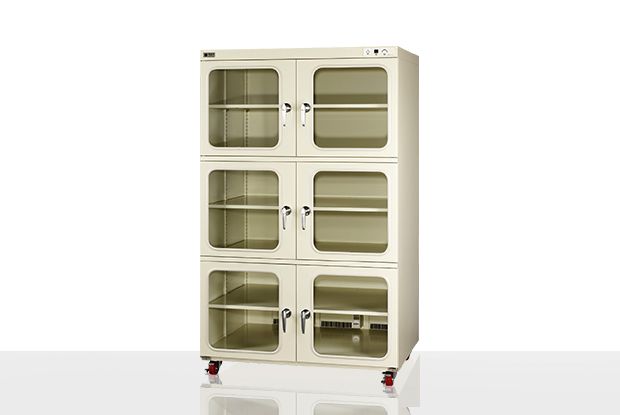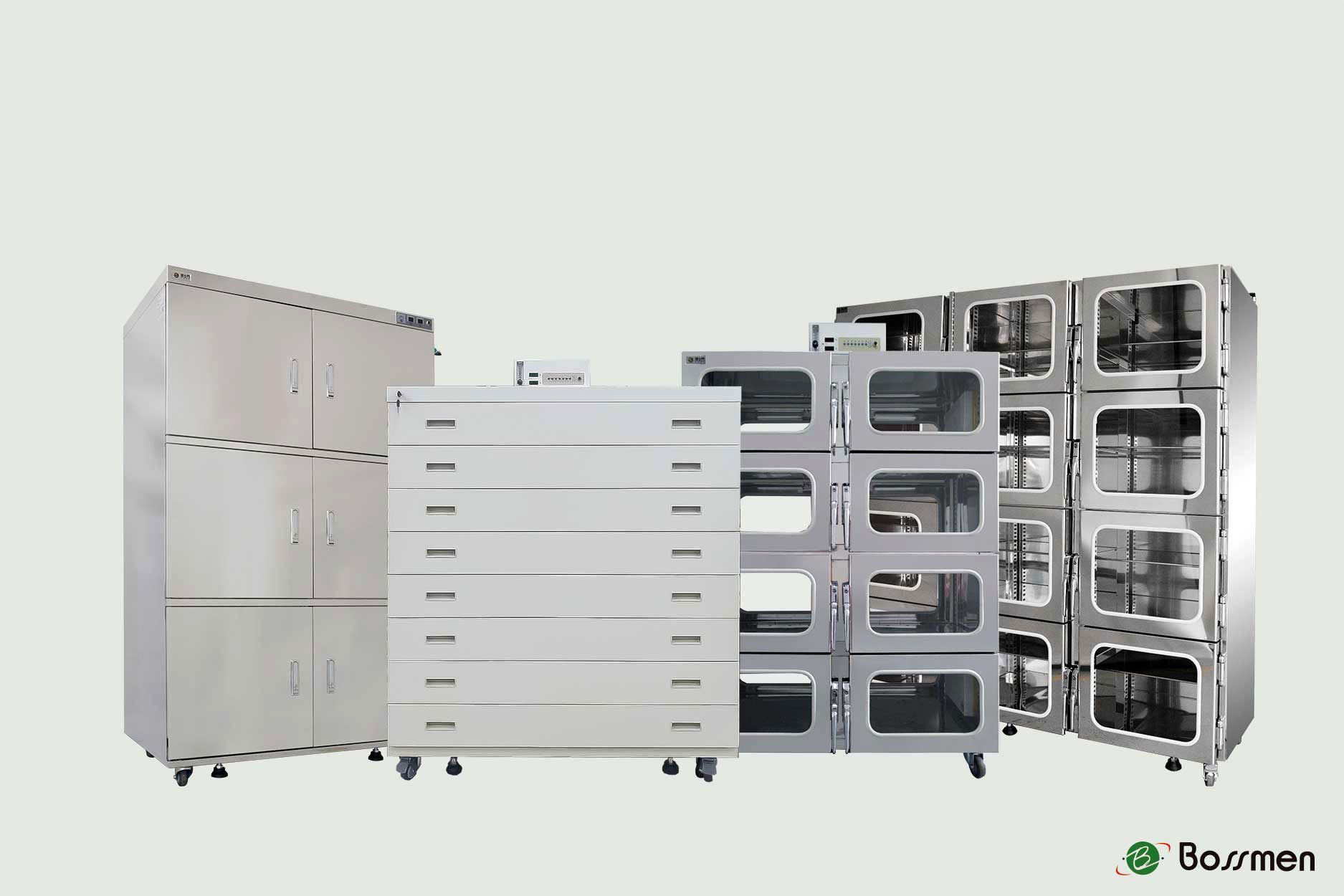
Nitrogen Cabinet and CDA Cabinet
Create a dry environment to maintain sensitive items in optimal condition
The Bossmen Energy-saving Nitrogen Cabinet and CDA Cabinet series is a high-performance clean storage cabinet that utilizes a nitrogen and CDA control system to automatically fill gases as needed, ensuring optimal dry conditions for storage. When the humidity exceeds the preset standard, the system automatically stops nitrogen filling, preventing unnecessary nitrogen waste and achieving energy savings. During use, the humidity value can be monitored in real-time via the LED display panel.
The multifunctional nitrogen cabinet design provided by Bossmen is fully customizable to meet customer needs and complies with standard industrial specifications. It is designed to improve manufacturing yield, reduce production and management costs, and provide the best solution to address nitrogen waste and poor humidity control. It is the most reliable storage partner in the industrial sector.
Key Moisture-Sensitive Products and Solutions in the Semiconductor Industry
In the semiconductor industry, moisture control is a critical issue as humidity can lead to material corrosion, oxidation, short circuits, or impact product performance. The following are key products in the semiconductor industry that require moisture protection:
1. Wafer
Semiconductor wafers are highly susceptible to moisture, which can cause oxidation or surface defects. Handling wafers requires low-humidity or moisture-free environments.
2. Probe Card
Probe cards must remain dry during testing, as moisture can degrade their contact performance or cause corrosion, affecting the accuracy of test results.
3. Solder Balls
Solder balls used in wafer or chip soldering are sensitive to moisture, which can impact the soldering quality or even lead to soldering failures.
4. Packaging Materials
Various materials used in semiconductor packaging, such as packaging adhesive and lead pins, are very sensitive to moisture. Moisture can cause packaging quality issues.
5. IC Substrates
IC substrates need to be stored in low-humidity environments to prevent moisture from affecting their structure and performance during storage and processing.
6. Ball Grid Array (BGA)
Solder balls and other components in BGA packages are vulnerable to moisture, which can cause soldering failures or lead pin corrosion.
7. Photoresist
Photoresist used in the fabrication of integrated circuits is extremely sensitive to humidity, and moisture can impact its imaging properties, affecting the semiconductor process.
8. Conductive Adhesives
Conductive adhesives must remain dry during the packaging process; otherwise, moisture can reduce conductivity and lead to poor soldering.
9. Thin Film Materials
In thin film deposition processes, moisture can affect the quality of the thin film, causing surface defects or unstable performance.
10. Optical Components
Optical components used in semiconductor processes, such as lenses and optical filters, must be stored in dry environments to prevent moisture from causing surface fogging or other optical performance issues.
11. Microelectronic Components
Microelectronic components like chips, resistors, capacitors, etc., must be stored in low-humidity environments to avoid circuit failures or corrosion caused by moisture.
12. Thin Film Transistors (TFT)
These components are highly sensitive to humidity, as moisture can adversely affect their performance, causing electrical instability or degradation.
13. Blue Light Diodes (LEDs)
Blue LEDs used in displays or lighting require moisture control, as humidity can affect their luminous efficiency and lifespan.
In the semiconductor industry, all these products must be stored or processed in low-humidity environments to ensure their quality and performance are not compromised by moisture. It is essential to protect these sensitive products using moisture-controlled storage cabinets, nitrogen environments, or dry air.
Key Moisture-Sensitive Materials and Solutions in the PCB Industry
In the printed circuit board (PCB) industry, moisture is one of the key factors affecting product quality. Moisture can lead to oxidation, soldering defects, short circuits, and component corrosion. Therefore, many raw materials and finished products in PCB manufacturing require moisture protection. The following are key products in the PCB industry that need moisture control:
1. Unassembled PCBs (Bare PCBs)
Unassembled PCBs (bare boards) are highly susceptible to moisture, which can cause oxidation on their surface and holes, affecting subsequent soldering processes and component attachment.
2. Assembled PCBs
Assembled PCBs, particularly those using Surface Mount Technology (SMT), are very sensitive to moisture. Moisture can affect soldering quality, especially for packages like Ball Grid Array (BGA) and Quad Flat No-lead (QFN). Moisture can cause solder cracks or even damage components during soldering.
3. PCB Substrates
PCB substrates, which support the circuit board, need to remain dry. Moisture can cause poor soldering or cause the board to expand or deform, affecting its performance and stability.
4. Solder Paste
Solder paste, which is a critical material in surface mount technology, is highly sensitive to moisture. Moisture reduces its stickiness, causing soldering defects or solder joint failures.
5. Solder Balls
Solder balls, used in SMT and BGA packaging, must stay dry to ensure their bonding performance. Moisture can reduce the bonding properties of the solder balls and cause soldering failures.
6. Electronic Components
Various components installed on the PCB (such as capacitors, resistors, diodes, ICs, etc.) need to be moisture-treated before soldering. Moisture can lead to surface oxidation or internal chemical reactions, impacting component performance.
7. Prepregs
Prepregs used in multi-layer PCB fabrication need to be stored dry. Moisture can affect the bonding properties of the material, leading to poor lamination during the manufacturing process and affecting the PCB's structural strength and reliability.
8. Photoresist Films
Photoresist films used in PCB manufacturing are moisture-sensitive. Moisture can alter the film's exposure characteristics, affecting the precision of the photolithography process.
9. PCB Packaging Materials
Packaging materials for finished PCBs, such as moisture barrier bags and anti-static bags, also need moisture control to prevent PCB damage during storage.
10. Soldering Equipment
Metal components in soldering equipment (such as soldering tips) need moisture control to prevent rust or poor soldering results.
11. PCB Test Fixtures
Equipment used for PCB testing, such as test jigs, must be stored in moisture-controlled environments to prevent inaccuracies in testing or component corrosion.
12. PCB Base Materials
Base materials for PCB fabrication (such as FR4, ceramic substrates, etc.) must remain dry to maintain their mechanical strength and processing performance.
13. Metal Connectors and Pins
Metal connectors and pins on the PCB can corrode due to moisture, affecting contact quality and current conduction.
14. Lead-Free Solder Materials
Lead-free solder materials (such as lead-free solder paste or solder wire) need to remain dry, as moisture can affect their melting points, compromising soldering quality.
15. Flex Circuits
Flexible PCBs also require moisture protection to avoid deformation or soldering defects due to moisture exposure.
In the PCB industry, moisture control is critical not only during the manufacturing process but also to ensure the quality of the final product. Using moisture-controlled equipment, such as moisture cabinets and nitrogen storage cabinets, is essential for storing and processing these materials and components to maintain process accuracy and product reliability.
Key Moisture-Sensitive Products and Storage Solutions in the Biotech and Medical Industry
In the biotech and medical industries, many products are highly sensitive to humidity, which can affect their quality, efficacy, stability, and safety. Therefore, moisture protection is an important measure to ensure the long-term preservation and performance of these products. Below are key products in the biotech and medical industries that require nitrogen and dry air cabinets:
1. Pharmaceuticals
○ Solid Drugs (Tablets, Capsules, etc.): Moisture can cause degradation, clumping, or loss of efficacy in solid drugs.
○ Liquid Drugs (Injectables, Oral Solutions, etc.): Moisture can lead to drug degradation or microbial contamination, affecting effectiveness and safety.
○ Vaccines and Biologics: These are highly temperature- and humidity-sensitive, particularly vaccines, which need to be stored in strictly controlled environments to prevent loss of efficacy due to moisture or high temperatures.
2. Medical Devices
○ Disposable Medical Devices: Devices like syringes, catheters, and surgical tools need to remain dry to prevent mold, bacteria, or corrosion.
○ Electronic Medical Devices: Devices such as pacemakers, ventilators, and monitors can suffer short circuits or damage due to moisture.
○ Implantable Medical Devices: Devices like artificial joints or hearts can be impacted by moisture, which can affect surface quality or compatibility with the human body.
3. Diagnostic Reagents
Diagnostic reagents, enzyme reagents, and other biological agents need to stay dry to prevent chemical degradation, loss of efficacy, or reduced testing accuracy.
4. Lab Tubes and Consumables
Lab consumables like blood collection tubes, centrifuge tubes, and reagent bottles must be kept dry to avoid contamination or errors in measurements.
5. Biological Samples
Biological samples (like blood, urine, tissue samples, etc.) must be stored in low-humidity environments to avoid degradation or structural changes due to moisture.
6. DNA/RNA
DNA and RNA are highly sensitive to humidity. Moisture can cause degradation, affecting their integrity and usability.
7. Medical Films and Packaging Materials
Materials used for packaging pharmaceuticals and medical devices (such as moisture barrier packaging and medical films) must remain dry to ensure sealing and protective properties.
8. Orthotic and Prosthetic Devices
Devices such as prosthetics and corrective devices must be stored in dry environments to prevent material deformation, corrosion, or damage from moisture.
9. Biologics
Biologic drugs like protein therapies, antibodies, and other biologic agents are extremely sensitive to moisture, which can destabilize their structures and reduce their efficacy.
10. Pharmaceutical Raw Materials
Pharmaceutical raw materials, such as powders and granules, need to be stored in low-humidity environments to avoid moisture-induced degradation or clumping.
11. Blood Products
Blood products like plasma and red blood cells need strict moisture control to prevent mold growth or chemical changes that would compromise product safety.
12. Dental Materials
Dental materials like toothpaste, powders, resins, and filling materials need to stay dry to prevent chemical reactions or material degradation.
13. Medical Imaging Equipment
Materials used in medical imaging, such as X-ray films or MRI films, must remain moisture-free to avoid poor image quality.
14. Health Supplements
Supplements like vitamins and dietary products are sensitive to moisture, which can cause clumping, degradation, or loss of efficacy.
15. Artificial Skin & Medical Fibers
Artificial skin and medical fibers need to be stored in dry conditions to maintain their structure and prevent degradation caused by moisture exposure.
In the biotech and medical industries, nitrogen and dry air cabinets are essential to ensure the safety, efficacy, stability, and longevity of these sensitive products.
Contact us now and let Bossmen help you build a high-yield production environment.
IC Substrate Board Airtight N2 Dry Cabinet
BM1080-1
The IC Substrate Board Airtight N2 Dry Cabinet is specifically designed for the storage needs...
DetailsMulti-purpose Nitrogen Cabinet
BM1137
The Bossmen Multi-purpose Nitrogen Cabinet offers a highly customizable design that allows...
DetailsProbe Card Drawer Cabinet with Pull-Out Trays
BM1159-2
In semiconductor manufacturing, probe cards are critical testing tools, and their precision...
DetailsEight-door double-sided nitrogen cabinet
BM1173
The Eight-door double-sided nitrogen cabinet is specifically designed for industries with high...
DetailsMagazine Carrier Airtight CDA Cabinet
BM1203
As experts in industrial humidity control and environmental monitoring, our Magazine Carrier...
DetailsMulti-purpose Nitrogen Cabinet
BM1226
The Multi-purpose Nitrogen Cabinet is a high-efficiency storage solution designed for sensitive...
Details4-door nitrogen cabinet (screen mount)
BM1235
The 4-door nitrogen cabinet (screen mount) is an efficient protective device designed for storing...
DetailsSix-Door Nitrogen Cabinet
BM1319,BM1319-2
The nitrogen humidity control cabinet is a storage solution designed for products that require...
DetailsWindowless Six-Door Nitrogen Cabinet
BM1343-2
The Nitrogen Humidity Control Cabinet is a storage solution designed for products requiring...
DetailsPassword lock Nitrogen Cabinet
BM1353
This Password lock Nitrogen Cabinet combines a high-security password lock system with advanced...
DetailsFour-Door Nitrogen Cabinet
BM1377-1
The Four-Door Nitrogen Cabinet is designed for the storage needs of electronics, semiconductors,...
DetailsAuto-Open Probcard Nitrogen Cabinet
BM3007
The probe card needle tip is prone to contamination during use. Without cleaning and drying,...
DetailsNitrogen Cabinet and CDA Cabinet – BOSSMEN Humidity Control & Storage Solutions
Use Nitrogen Cabinet and CDA Cabinet to prevent moisture damage and stabilize sensitive materials in factories, labs, and museums. BOSSMEN helps teams improve yield, reliability, and preservation by keeping components and collections in controlled environments that fit existing workflows.
Backed by decades of engineering and field experience, BOSSMEN designs and manufactures solutions such as dry cabinets, glove boxes, monitoring systems, and museum display/storage equipment. Each Nitrogen Cabinet and CDA Cabinet option is built for consistent performance and straightforward maintenance across semiconductor, electronics, laboratory, and cultural institutions.
Explore models, capacities, and configuration choices to match your target RH and handling needs. Our specialists provide practical deployment advice—from site planning to validation—so your Nitrogen Cabinet and CDA Cabinet achieves measurable results quickly.

